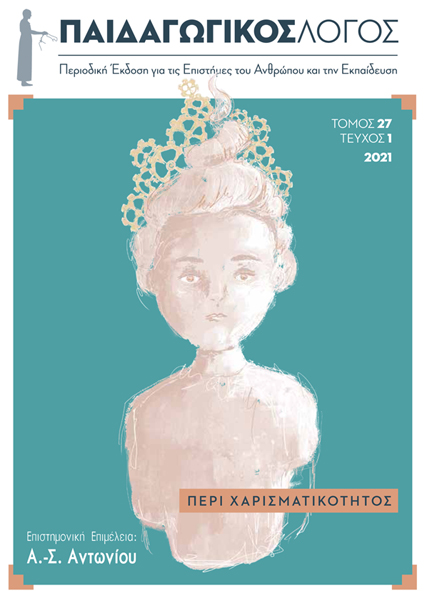Επίδραση του Βαθμού Τελειοθηρίας στα Ψυχοσυναισθηματικά και Γνωστικά Χαρακτηριστικά των Παιδιών με Υψηλές Ακαδημαϊκές Επιδόσεις
Abstract
Ένας αυξανόμενος αριθμός ερευνητικών ευρημάτων έχει συνδέσει την ύπαρξη τελειοθηρίας σε παιδιά και εφήβους, τόσο με δυσκολίες στη σχολική και κοινωνική προσαρμογή όσο και με συνοδά προβλήματα, συμπεριλαμβανομένων έντονης ψυχικής δυσφορίας και αυξημένων επιπέδων άγχους. Συγκεκριμένα, τα παιδιά με υψηλές ακαδημαϊκές επιδόσεις έχουν την τάση να προσπαθούν έχοντας ως στόχο την τελειότητα και ασκώντας αυστηρή κριτική στους εαυτούς τους με το να αντιλαμβάνονται και το ελάχιστο λάθος τους ως απόδειξη αποτυχίας. Η τελειοθηρία συνήθως αναφέρεται σε δύο βασικές κατηγορίες: την αυτοπροσανατολιζόμενη και την κοινωνικά οριζόμενη τελειοθηρία. Και οι δυο αυτές εκφάνσεις της τελειοθηρίας έχουν επίδραση στην ακαδημαϊκή επίδοση των παιδιών. Όσον αφορά στις συναισθηματικές συνέπειες της τελειοθηρίας έχουν παρατηρηθεί αυξημένα επίπεδα φόβου και μελαγχολίας καθώς και συσχέτιση με άγχος, κατάθλιψη και ψυχοσωματικά συμπτώματα. Ακόμη, τα παιδιά με υψηλά επίπεδα τελειοθηρίας χαρακτηρίζονται από μία συνεχή ανησυχία ως προς τη σχολική τους επίδοση και βαθμολογία αλλά και από έντονο βαθμό ανταγωνιστικότητας έναντι των συμμαθητών τους. Η ανταγωνιστικότητα δε αυτή ενισχύεται από τη σύνδεσή της με έντονη και συστηματική διάθεση αυτοκριτικής ως αποτέλεσμα της εικόνας που τα άτομα αυτά επιθυμούν να εμφανίσουν στους άλλους. Χαρακτηριστικό ερευνητικό εύρημα θεωρείται η υψηλή θετική συσχέτιση μεταξύ τελειοθηρίας, κατάθλιψης και του κοινωνικού άγχους, του βαθμού κοινωνικής υποστήριξης από το περιβάλλον αναφοράς και των στρατηγικών αντιμετώπισης των στρεσογόνων καταστάσεων και επίλυσης των κοινωνικών προβλημάτων.
Article Details
- Come citare
-
Αντωνίου Α.-Σ., & Ξυπολιτά Ε. (2021). Επίδραση του Βαθμού Τελειοθηρίας στα Ψυχοσυναισθηματικά και Γνωστικά Χαρακτηριστικά των Παιδιών με Υψηλές Ακαδημαϊκές Επιδόσεις. Παιδαγωγικός Λόγος, 27(1), 165–181. https://doi.org/10.12681/plogos.27927
- Fascicolo
- V. 27 N. 1 (2021): Περί Χαρισματικότητος
- Sezione
- Articles

Questo lavoro è fornito con la licenza Creative Commons Attribuzione - Non commerciale - Non opere derivate 4.0 Internazionale.
Οι Συγγραφείς που δημοσιεύουν εργασίες τους σε αυτό το περιοδικό συμφωνούν στους παρακάτω όρους:
- Οι Συγγραφείς διατηρούν τα Πνευματικά Δικαιώματα και χορηγούν στο περιοδικό το δικαίωμα της πρώτης δημοσίευσης, ενώ ταυτόχρονα τα πνευματικά δικαιώματα της εργασίας προστατεύονται σύμφωνα με την χρήση άδειας που υιοθετεί ο «Παιδαγωγικός Λόγος - Περιοδική Έκδοση για τις Επιστήμες του Ανθρώπου και την Εκπαίδευση» : Αναφορά Δημιουργού – Μη Εμπορική Χρήση – Όχι Παράγωγα Έργα 4.0 (CC BY-NC-ND). Αυτή η άδεια επιτρέπει στους άλλους να έχουν πρόσβαση στο έργο και να το μοιράζονται με άλλους, εφόσον κάνουν αναφορά σε αυτό, ωστόσο δεν μπορούν να το αλλάξουν με κανένα τρόπο ούτε να το χρησιμοποιούν για εμπορική χρήση.
- Οι συγγραφείς μπορούν να συνάπτουν ξεχωριστές και πρόσθετες συμβάσεις και συμφωνίες για τη μη αποκλειστική διανομή της εργασίας, όπως δημοσιεύτηκε στο περιοδικό αυτό (π.χ. κατάθεση σε ένα ακαδημαϊκό καταθετήριο ή δημοσίευση σε ένα βιβλίο), με την προϋπόθεση της αναγνώρισης και την αναφοράς της πρώτης δημοσίευσης σε αυτό το περιοδικό.
- Το περιοδικό επιτρέπει και ενθαρρύνει τους συγγραφείς να καταθέτουν τις εργασίες τους μέσω διαδικτύου (π.χ. σε ένα ακαδημαϊκό καταθετήριο ή στους προσωπικές τους ιστοσελίδες) πριν και μετά από τις διαδικασίες της δημοσίευσης, καθώς αυτό μπορεί να οδηγήσει σε παραγωγική ανταλλαγή ιδεών και σκέψεων, καθώς επίσης και σε γρηγορότερη και μεγαλύτερη χρήση και ευρετηρίαση της δημοσιευμένης εργασίας



